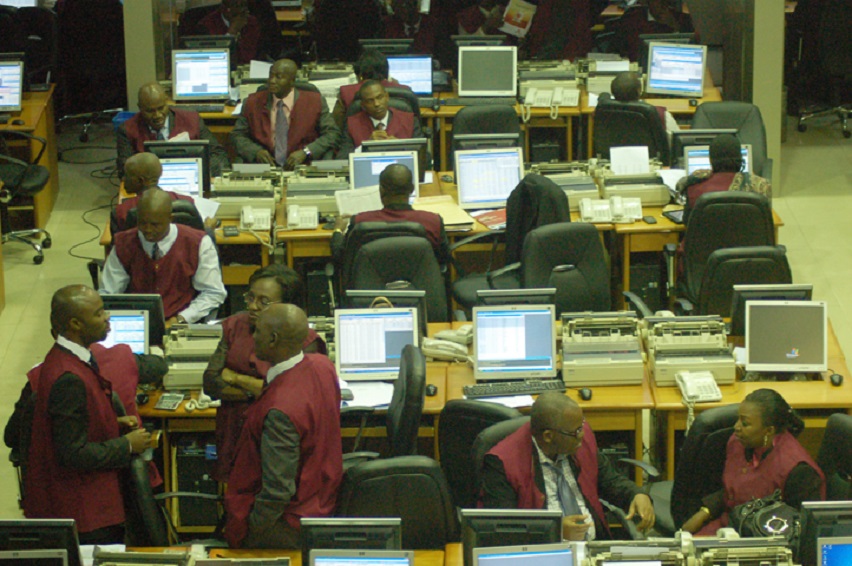Economy
39 Stocks Depreciate NSE Index by 2.48% in Four Trading Days

Dipo Olowookere
A total of 39 stocks trading on the Nigerian Stock Exchange (NSE) caused the All-Share Index (ASI) to depreciate by 2.48 percent to settle at 26,987.45 points in the four trading days last week.
The market opened for only four days in the week as a result of the public holiday declared by the federal government to celebrate the 59th anniversary of Nigeria’s independence from Britain in 1960.
The local stock market was mostly bearish for the week as investors stayed back to watch happenings from both the local and the global scenes, especially with the impeachment threat staring at President Donald Trump of the United States of America (USA) as well as activities on the global oil market, which is giving many investors serious concerns because of the price of the Brent crude, which fell below Nigeria’s benchmark of $60 per barrel in the week.
Shares in the oil and gas sector had a feel of this heat as they went down in the week at the domestic bourse by 2.25 percent.

CBN’s Fine Affects Banking Stocks
On the local scene, investors pondered on the action of the Central Bank of Nigeria (CBN) on 12 financial institutions, six of which are listed on the stock exchange. The dozen of banks were punished by the industry watchdog for failing to loan a certain amount of money in their custody to their customers as directed by the CBN.
In July 2019, the central bank had ordered lenders operating in the country to give 60 percent of their deposits to customers as loan so as to boost the economy.
The apex bank was hoping to use its loan policy to promote lending to the real sector of the economy so as to fast-track its recovery process after it slipped into recession over three year ago.
In the circular issued to the banks in July, the central bank had warned that failure do adhere to the 60 percent loan-to-deposit ratio would attract a sanction, which involves taking certain amount from their deposits to their cash reserves with the apex bank.
After the holiday, the CBN fined the 12 financial institutions the sum of N499.2 billion and this development caused selloffs in the banking space in the week, resulting into a 3.94 percent weekly loss.
Also, on the local scene, the persistent low purchasing power of Nigerians affected stocks in the consumer goods space at the market, leaving its barometer going down by 4.92 percent in the week.
Stock Performance In The Week

From the data harvested by Business Post on the NSE, Fidson Healthcare was the week’s heaviest loser as its stocks went down by 18.89 percent to close at N3.65 per share, while Ecobank followed with a loss of 14.61 percent to finish at N7.60 per unit.
UAC Nigeria fell by 14.38 percent to end at N6.55 per share, Africa Prudential depreciated by 9.97 percent to settle at N3.52 per unit, while Beta Glass declined by 9.96 percent to close at N53.80 per share.
At the other end, Continental Reinsurance shares went up by 20.11 percent to finish at N2.27 per unit, while Law Union and Rock Insurance followed with 12.82 percent appreciation to close at 44 kobo per unit.
Niger Insurance gained 10.00 percent to finish at 22 kobo per share, CAP improved by 9.89 percent to close at N25.55 per unit, while Caverton appreciated by 8.33 percent to settle at N2.60 per share.
In all, a total of 15 equities appreciated in price during the week, lower than 22 equities in the previous week, while 39 equities depreciated in price, lower than 42 equities in the previous week, with 112 equities remaining unchanged, higher than 102 equities recorded in the preceding week.
During the week, the market capitalisation also depreciated by 2.48 percent like the index to close and N13.137 trillion. Similarly, all other indices finished lower with the exception of NSE insurance and NSE industrial goods indices, which appreciated by 5.71 percent and 0.14 percent respectively, while the NSE ASeM index closed flat.

Activity Level In The Week
For the market turnover, a total of 660.7 million shares worth N9.2 billion were traded by investors in the week in 12,032 deals against the total of 1.1 billion shares valued at N16.7 billion that exchanged hands a week earlier in 14,717 deals.
A breakdown of the transactions showed that the financial services industry (measured by volume) led the activity chart with 458.2 million shares valued at N5.9 billion traded in 6,720 deals, contributing 69.35 percent and 64.27 percent to the total equity turnover volume and value respectively.
The conglomerates industry followed with 55.8 million shares worth N124.5 million in 545 deals, while the third place was occupied by construction/real estate sector with a turnover of 54.3 million shares worth N62.6 million in 135 deals.
Trading in GTBank Access Bank and FBN Holdings measured by volume accounted for 280.7 million shares worth N4.9 billion in 2,985 deals, contributing 42.49 percent and 53.43 percent to the total equity turnover volume and value respectively.
Other Transactions In The Week
Away from the stock market, investors traded a total of 3,015 units of Extended Traded Funds (ETFs) valued at N701,234.17 in the week in 16 deals compared with a total of 16,253 units valued at N1.103 million transacted the previous week in 13 deals.
For the bond market, a total of 4,250 units of Federal Government Bonds valued at N4.305 million were traded in the week in 6 deals compared with a total of 36,581 units valued at N37.504 million transacted a week earlier in 16 deals.

What to Expect This Week
Business Post returns that as investors prepare for the new week, they would be anticipating the return of bulls to the market, though happenings around don’t indicate this would occur.
At the moment, attention is focused on the decision of the United States Fed on whether it would lower interest rate, which is very much likely to happen. In addition, there would be huge expectations on the proposed talks between Washington DC and Beijing on the trade spat.
Further attention would be on oil, which rose slightly on Friday after enduring series of falls last week. Investors would hope to have things better in the week with news that Saudi’s Aramco has recovered from the attacks on its oil facilities few weeks ago by Yemen’s Iran-backed Houthi rebels.
On the local scene, there are more to worry about especially with the steady decline in the nation’s foreign reserves, which have fallen below $42 billion. This development is expected to put pressure on the Naira at the foreign exchange (forex) market this week.
Economy
Flour Mills Supports 2026 Paris International Agricultural Show

By Modupe Gbadeyanka
For the second time, Flour Mills of Nigeria Plc is sponsoring the Paris International Agricultural Show (PIAS) as part of its strategies to fortify its ties with France.
The 2026 PIAS kicked off on February 21 and will end on March 1, with about 607,503 visitors, nearly 4,000 animals, and over 1,000 exhibitors in attendance last year, and this year’s programme has already shown signs of being bigger and better.
The theme for this year’s event is Generations Solution. It is to foster knowledge transfer from younger generations and structure processes through which knowledge can be harnessed to drive technological advancement within the global agricultural sector.
In his address on the inaugural day of the Nigerian Pavilion on February 23, the Managing Director for FMN Agro and Director of Strategic Engagement/Stakeholder Relations, Mr Sadiq Usman, said, “At FMN, our mission is Feeding and Enriching Lives Every Day.
“This is a mandate we have fulfilled through decades of economic shifts, rooted in a culture of deep resilience and constant innovation. We support this pavilion because FMN recognises that the next frontier of global Agribusiness lies in high-level technical exchange.
“We thank the France-Nigeria Business Council (FNBC), the organisers of the PIAS, and our fellow members of the Nigerian Pavilion – Dangote, BUA, Zenith, Access, and our partners at Creativo El Matador and Soilless Farm Lab— we are exceedingly pleased to work to showcase the true face of Nigerian commerce.”
Speaking on the invaluable nature of the relationship between Nigeria and France, and the FMN’s commitment to process and product innovation, Mr John G. Coumantaros, stated, “The France – Nigeria relationship is a valuable partnership built on a shared value agenda that fosters remarkable Intercontinental trade growth.
“Also, as an organisation with over six decades of transformational footprint in Nigeria and progressively across the African Continent, FMN has been unwaveringly committed to product and process innovation.
“Therefore, our continuous partnership with France for the success of the Paris International Agricultural Show further buttresses the thriving relationship between both countries.”
PIAS is one of the most widely attended agricultural shows, with thousands of people from across the world in attendance.
Economy
NEITI Backs Tinubu’s Executive Order 9 on Oil Revenue Remittances

By Adedapo Adesanya
Despite reservations from some quarters, the Nigeria Extractive Industries Transparency Initiative (NEITI) has praised President Bola Tinubu’s Executive Order 9, which mandates direct remittances of all government revenues from tax oil, profit oil, profit gas, and royalty oil under Production Sharing Contracts, profit sharing, and risk service contracts straight to the Federation Account.
Issued on February 13, 2026, the order aims to safeguard oil and gas revenues, curb wasteful spending, and eliminate leakages by requiring operators to pay all entitlements directly into the federation account.
NEITI executive secretary, Musa Sarkin Adar, called it “a bold step in ongoing fiscal reforms to improve financial transparency, strengthen accountability, and mobilise resources for citizens’ development,” noting that the directive aligns with Section 162 of Nigeria’s Constitution.
He noted that for 20 years, NEITI has pushed for all government revenues to flow into the Federation Account transparently, calling the move a win.
For instance, in its 2017 report titled Unremitted Funds, Economic Recovery and Oil Sector Reform, NEITI revealed that over $20 billion in due remittances had not reached the government, fueling fiscal woes and prompting high-level reforms.
Mr Adar described the order as a key milestone in Nigeria’s EITI implementation and urged amendments to align it with these reforms.
He affirmed NEITI’s role in the Petroleum Industry Act (PIA) and pledged close collaboration with stakeholders, anti-corruption bodies, and partners to sustain transparent management of Nigeria’s mineral resources.
Meanwhile, others like the Petroleum and Natural Gas Senior Staff Association of Nigeria (PENGASSAN) have kicked against the order, saying it poses a serious threat to the stability of the oil and gas industry, calling it a “direct attack” on the PIA.
Speaking at the union’s National Executive Council (NEC) meeting in Abuja on Tuesday, PENGASSAN President, Mr Festus Osifo, said provisions of the order, particularly the directive to remit 30 per cent of profit oil from Production Sharing Contracts (PSCs) directly to the Federation Account, could destabilise operations at the Nigerian National Petroleum Company (NNPC) Limited.
Mr Osifo firmly dispelled rumours of imminent protests by the union, despite widespread claims that the controversial executive order threatens the livelihoods of 10,000 senior staff workers at NNPC.
He noted, however, that the union had begun engagements with government officials, including the Presidential Implementation Committee, and expressed optimism that common ground would be reached.
Mr Osifo, who also serves as President of the Trade Union Congress (TUC), expressed concerns that diverting the 30 per cent profit oil allocation to the Federation Account Allocation Committee (FAAC), without clearly defining how the statutory management fee would be refunded to NNPC, could affect the salaries of hundreds of PENGASSAN members.
Economy
Dangote Cement Deepens Dominance, Export Activities With $1bn Sinoma Deal

By Aduragbemi Omiyale
To strengthen its domestic market dominance, drive its export activities, optimise existing operational assets and enhance production efficiency and capacity expansion, Dangote Cement Plc has sealed $1 billion strategic agreements with Sinoma International Engineering for cement projects across Africa.
The president of Dangote Industries Limited, the parent firm of Dangote Cement, Mr Aliko Dangote, disclosed that the deal reinforces the company’s long-term growth strategy and aligns with the broader aspirations of the Dangote Group’s Vision 2030.
According to him, Sinoma will construct 12 new projects and expand others for the cement organisation across Africa, helping to achieve 80 million tonnes per annum (MTPA) production capacity by 2030, while supporting the group’s overarching target of generating $100 billion in revenue within the same period.
Under the Strategic Framework Agreement, Sinoma will collaborate with Dangote Cement on the delivery of new plants, brownfield expansions, and modernisation initiatives aimed at strengthening operational performance across key markets.
The new projects include a new integrated line in Northern Nigeria with a satellite grinding unit, a new line in Ethiopia and other projects in Zambia/Zimbabwe, Tanzania, Sierra Leone and Cameroon. In Nigeria, Sinoma will also handle different projects in Itori, Apapa, Lekki, Port Harcourt and Onne.
The projects signal Dangote Cement’s sustained commitment to consolidating its leadership position within the African cement industry, while enhancing its competitiveness on the global stage.
Chairman of the Dangote Cement board, Mr Emmanuel Ikazoboh, during the agreement signing event in Lagos, explained that the new projects would enable the company to play a critical role in actualising Dangote Group’s Vision 2030.
The new projects, when completed, will increase Dangote Cement’s capacity and dominant position in Africa’s cement industry.
On his part, the Managing Director of Dangote Cement, Mr Arvind Pathak, said the agreement reflects the company’s determination to grow its investments across African markets to close supply gaps and support the continent’s infrastructural ambitions.
According to him, Dangote Cement is committed to making Africa fully self‑sufficient in cement production, creating more value and linkages, leading to increased economic activities and a reduction in unemployment.
-

 Feature/OPED6 years ago
Feature/OPED6 years agoDavos was Different this year
-
Travel/Tourism10 years ago
Lagos Seals Western Lodge Hotel In Ikorodu
-

 Showbiz3 years ago
Showbiz3 years agoEstranged Lover Releases Videos of Empress Njamah Bathing
-

 Banking8 years ago
Banking8 years agoSort Codes of GTBank Branches in Nigeria
-

 Economy3 years ago
Economy3 years agoSubsidy Removal: CNG at N130 Per Litre Cheaper Than Petrol—IPMAN
-

 Banking3 years ago
Banking3 years agoSort Codes of UBA Branches in Nigeria
-

 Banking3 years ago
Banking3 years agoFirst Bank Announces Planned Downtime
-

 Sports3 years ago
Sports3 years agoHighest Paid Nigerian Footballer – How Much Do Nigerian Footballers Earn












